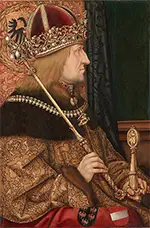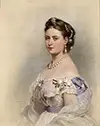Frederick III: Emperor of Germany
Frederick III was Emperor of Germany for just a few months, in the latter half of the 19th Century. His short reign came between two long and powerful ones. 
He was born on Oct. 18, 1831, in New Palace, in Potsdam, in the Kingdom of Prussia. His father was the eventual Emperor Wilhelm I, and his mother was Princess Augusta of Saxe-Weimar-Eisenrach. Frederick was the son and heir apparent and had education and training to match those expectations. His father proved to be a very competent soldier, leading Prussian troops to victory in a series of wars. Frederick, too, proved adept as a military man, fighting against Austria, Denmark, and France and deftly managing the conflicting personalities of his fellow officers. His father became King of Prussia in 1861, and Frederick became Crown Prince at that time. A decade later, Wilhelm became emperor, as Germany united under Prussian leadership, built on the principle of "blood and iron," as promised by Chancellor Otto von Bismarck. Frederick, however, despite his military successes, did not approve wholeheartedly of military conquest as a means of advancement. He found himself more and more troubled by the wars in which he was fighting and sought to advance the cause of peace instead, preferring to focus more on the cultural enhancement of the empire rather than the geographical expansion of it. Naturally, both his father and Bismarck preferred the reverse, and this led to estrangement between father and son. 
Frederick had married Victoria, eldest daughter of the United Kingdom's Queen Victoria and Prince Albert, in 1858. They had eight children, six of whom lived into adulthood: Wilhelm (1859), Charlotte (1860), Henry (1862), Viktoria (1866), Sophia (1870), and Margaret (1872). The royal couple found much to like about each other and worked together for many years, advancing causes associated more with liberal ideas. Wilhelm named Frederick Protector of Public Museums, and the Crown Prince set about acquiring great art works to display in great museums, as part of a greater effort to make the new capital, Berlin, into a center of culture. This kind of activity was certainly more to Frederick's liking than fighting in wars, although he did just when ordered to do so. After the wars had been won and the empire had been formed, he represented the German leadership at many official functions, spending more and more time with his wife's parents, in the U.K. 
Frederick smoked heavily for years and years. In 1887, doctors diagnosed him with throat cancer. He had many operations and spent a considerable time in warmer climates, to try to forestall the inevitable. His condition deteriorated further, and he underwent a tracheotomy in January 1888. From that point forward, he could not speak. He was still suffering from an increasing number of maladies when his father died, on March 9, 1888. Thus, Frederick became emperor even though he was incapacitated. He roused himself for two state visits, welcoming both his mother-in-law and Sweden and Norway's King Oscar II. His health continued to decline, however, and his reign lasted all of 99 days. He died on June 15, 1888. His son, then 29, became Kaiser Wilhelm II. |
|
Social Studies for Kids
copyright 2002–2024
David White




